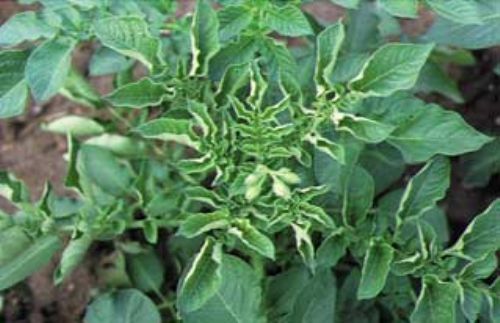
Managing virus control in seed potatoes is important every year and using an aphicide with strong repellency can prevent aphids from feeding and transmitting damaging viruses, which is the main objective of an aphicide in this crop.
Aphid transmitted viruses such as Potato Leaf Roll Virus (PLRV) and Potato Virus Y (PVY) are the major reason for potato crops failing seed certification. ’In order to protect against these viruses, you need to prevent aphids feeding. For PLRV which is a persistent virus, the aphids are infective all their life and need to feed for a long time to transmit the virus. PVY is a non-persistent virus which means that the virus is held on the aphids’ mouthparts and is transmitted very rapidly within seconds of feeding. To make sure that crops are protected from both these virus types, growers need to use an aphicide that has a rapid knockdown as well as strong anti-feeding and repellency effects. Pyrethroid aphicides have these features but not all pyrethroids are the same,’ says Barrie Hunt of Interfarm UK Ltd.
’Esfenvalerate in Sumi-Alpha and Sven offers better repellency than most other pyrethroids. Laboratory studies show that esfenvalerate exceeds the repellency of lambda-cyahalothrin for example. In this research 17% of aphids still chose to go to the lamda-cyahalothrin treated plant over the untreated one, whereas only 4% chose to go to the esfenvalerate treated plant,’ he says.
’The pyrethroid market is a busy market; esfenvalerate is one of the best, not just in terms of its activity, offering superior repellency and longer protection against aphids and other insect pests, but also in terms of minimising the effects on bees and beneficials.’
Barrie explains that the Sumi-Alpha and Sven had potatoes added to their labels last year. ’They are also now accepted by processors and included on crop protocols. With resistance management in mind, the use of esfenvalerate needs to be integrated with other aphicides with different modes of action. Growers should also monitor aphids and only act when thresholds are exceeded.’
’Initially the cold winter was thought to have reduced the aphid threat and also delayed aphid flights. But the warmer January, February and March and the very warm April have lead experts at Rothamsted Research to estimate that potato aphids may arrive one to two weeks earlier than the 10-year mean and about 3 to 4 weeks ahead of forecast and such activity may well herald an epidemic. Aphids are already a threat this year on the near Continent. Potato growers should be alert to the threat and be in a position to action an effective virus prevention programme when appropriate,’ says Barrie Hunt.
Sumi-Alpha and Sven contain 25 gms ai/litre esfenvalerate formulated as an emusifiable concentrate in a 1 litre pack. In potatoes they are recommended at 200 mls/ha, with a maximum 4 applications per crop. They are also recommended on a wide range of agricultural and horticultural crops including winter wheat, winter barley, spring wheat, spring wheat, vining peas, edible podded peas, combining peas, field beans, cabbages, Chinese cabbage, kale, Brussels Sprouts, cauliflower, broccoli/calabrese, Kohlrabi, ornamental plants, permanent grassland, rotational grassland and managed amenity turf. They are recommended for the control of aphids, caterpillars, weevils, thrips, midges, leaf rollers, leaf miners, whitefly and bibionid larvae and preventing viruses.
